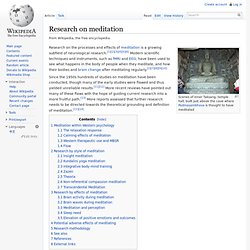

Study shows how prayer, meditation affect brain activity. Research on meditation. Scenes of Inner Taksang, temple hall, built just above the cave where Padmasambhava is thought to have meditated Research on the processes and effects of meditation is a growing subfield of neurological research.[1][2][3][4][5][6] Modern scientific techniques and instruments, such as fMRI and EEG, have been used to see what happens in the body of people when they meditate, and how their bodies and brain change after meditating regularly.[2][7][8][9][10] Since the 1950s hundreds of studies on meditation have been conducted, though many of the early studies were flawed and thus yielded unreliable results.[11][12] More recent reviews have pointed out many of these flaws with the hope of guiding current research into a more fruitful path.[13] More reports assessed that further research needs to be directed towards the theoretical grounding and definition of meditation.[11][14] Meditation within Western psychology[edit] The relaxation response[edit]

Meditation increases brain gray matter. Push-ups, crunches, gyms, personal trainers -- people have many strategies for building bigger muscles and stronger bones.

But what can one do to build a bigger brain? Meditate. How Meditation May Change the Brain. Getty Images Over the December holidays, my husband went on a 10-day silent meditation retreat.

Not my idea of fun, but he came back rejuvenated and energetic. He said the experience was so transformational that he has committed to meditating for two hours daily, one hour in the morning and one in the evening, until the end of March. He’s running an experiment to determine whether and how meditation actually improves the quality of his life.